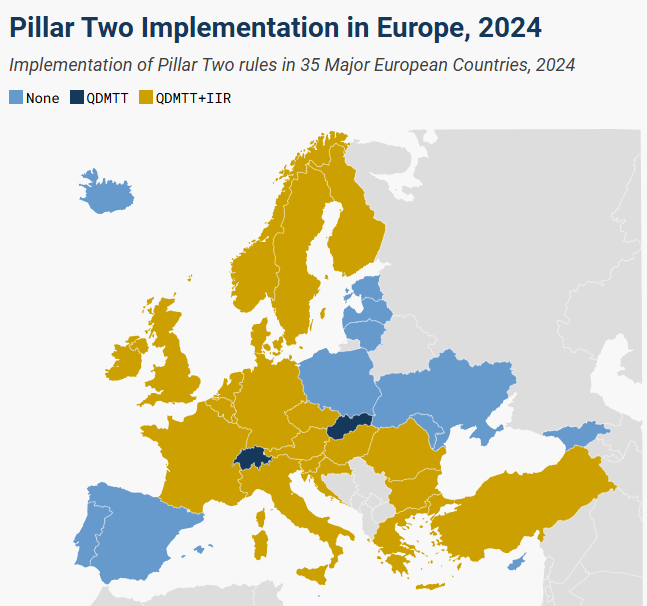Eighteen of the 27 Member States of the European Union have implemented both the IIR and the QDMTT in 2024, while nine have not.
Five EU Member States can opt for a six-year deferral of Pillar Two implementation, and all of them have done so, with Estonia, Latvia, Lithuania, and Malta deferring all rules until 2029, while Slovakia selectively implemented only a domestic top-up tax in 2024.
Four other EU Member States—Cyprus, Poland, Portugal, and Spain—have not implemented Pillar Two rules despite obligations to do so under the EU Directive. Poland deferred the implementation of QDMTT and IIR by one year, to 2025. Cyprus, Portugal, and Spain have published draft laws providing for the implementation of an IIR in 2024 (and QDMTTs, except for Cyprus), but these laws have not been officially enacted yet.
Among eight major European countries outside of the European Union, only Norway, Turkey, and the United Kingdom have implemented both a QDMTT and an IIR in 2024. In Norway and Turkey, a UTPR is set to apply in 2025, while the UK has not announced a commencement date. Switzerland implemented a QDMTT in 2024 but has not set a date for either an IIR or a UTPR. Iceland is undergoing public consultation to implement a QDMTT and an IIR in 2025, with no statements regarding a UTPR. Georgia, Moldova, and Ukraine, the latest candidates for EU accession, have not publicly announced intentions to implement any Pillar Two rules.
In contrast to many European countries, the US has chosen not to implement changes in line with the global tax deal. Tax treaty ratification requires 67 votes in the Senate, making the adoption without broad, bipartisan support in the US challenging. Pillar Two poses multiple risks to the US tax base: recent guidance on Pillar Two means that US global intangible low-taxed income (GILTI) would apply after foreign minimum taxes, reducing US tax revenues from the tax on GILTI. Further, the application of IIRs may tax US income of multinational companies, while the application of a UTPR would even tax US companies on US income.
Since extraterritorial taxation measures like the IIR and UTPR can risk tax and trade disputes, European countries that negotiate free trade agreements on their own, rather than as part of a larger trading bloc, face stronger incentives to avoid measures that could provoke retaliation.
Stay informed on the tax policies impacting you.
Subscribe to get insights from our trusted experts delivered straight to your inbox.
